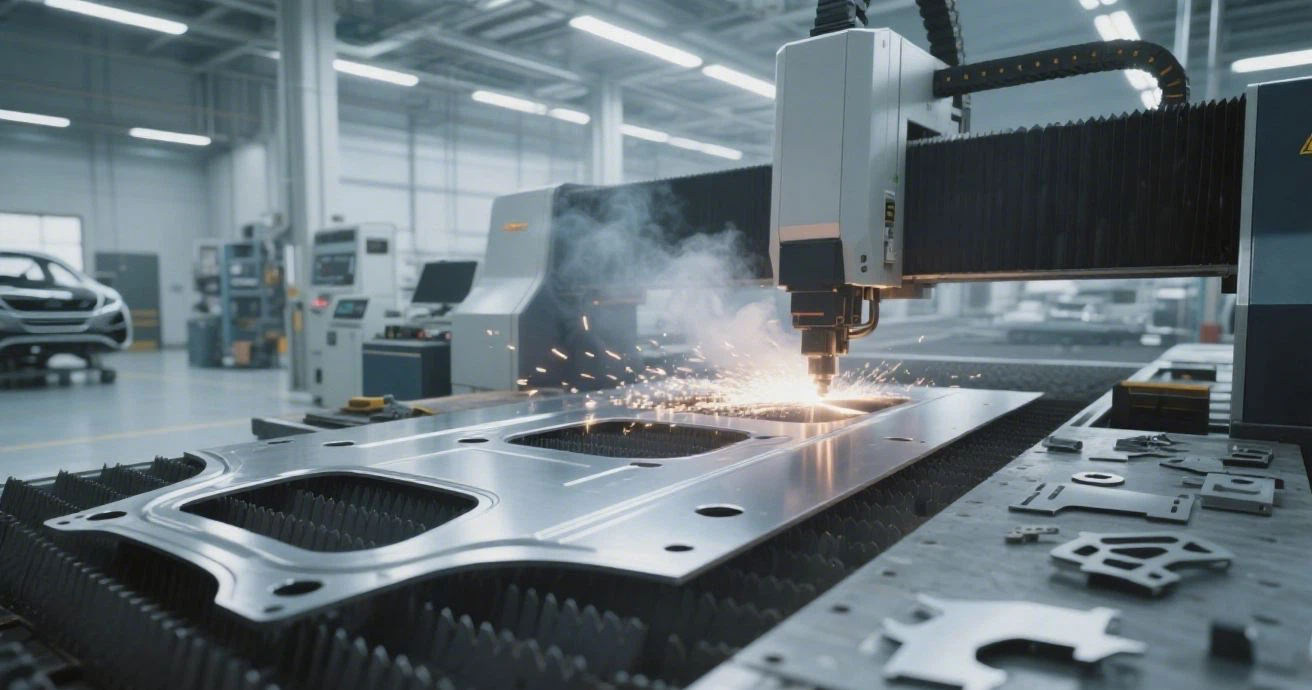-
Phone
+8613682329217
-
Address
Building 5, COFCO (Fuan) Robot Intelligent Manufacturing Industrial Park, No. 90 Dayang Road, Fuhai Street, Bao'an District, Shenzhen, China, 518103
-
E-mail
Laser machines in the automotive industry have transformed from futuristic concepts into essential manufacturing technologies. These precision tools now power everything from electric vehicle production to traditional car assembly lines.
Modern automakers rely on lasers to create stronger, lighter vehicles while maintaining flawless quality through automation. This guide explores four critical laser technologies revolutionizing today's factory floors: welding, cutting, marking, and cleaning.
Why Lasers Drive Modern Automotive Manufacturing
Lasers deliver unmatched advantages that traditional manufacturing methods simply can't match.
Unmatched Precision
Lasers achieve micron-level accuracy. This means perfect cuts, welds, and markings every single time.
Incredible Speed
Production lines move faster with laser technology. What once took hours now happens in minutes.
Versatility Across Materials
One laser system handles diverse materials:
- High-strength steel
- Aluminum alloys
- Copper components
- Plastic parts
- Carbon fiber composites
Automation-Ready Design
Lasers work without physical contact. This makes them perfect for robotic integration and 24/7 automated production.
Laser Welding
Traditional spot welding creates weak points and adds unnecessary weight through flanges.
Laser welding cars solves this problem completely. It creates continuous, stronger seams across roofs, doors, and body panels. The result? Vehicles that are both lighter and safer with improved torsional rigidity.
Tesla's Model 3 showcases this technology perfectly. The company uses laser welding to create seamless body joints that would be impossible with traditional methods.

The EV Revolution
EV battery welding presents unique challenges. You need to join dissimilar metals like copper and aluminum without heat damage to sensitive battery cells.
Laser welding provides the precise energy control needed for strong, low-resistance connections. This technology ensures optimal battery performance and safety in electric vehicles.
Major automakers like BMW and Volkswagen now use laser welding for:
- Battery tray assembly
- Busbar connections
- Cell-to-module joining
- Thermal management systems
Powertrain and Exhaust Systems
Laser welding delivers high-precision, durable joints for:
- Transmission gears
- Engine components
- High-temperature exhaust systems
- Turbocharger housings
Laser Cutting

Modern cars use complex 3D hydroformed parts that mechanical cutting simply can't handle. Laser cutting automotive parts creates intricate chassis components with perfect accuracy.
Advanced high-strength steels require precise cutting to maintain their structural properties. Lasers deliver clean cuts without affecting the metal's strength characteristics.
Crafting the Car's Interior
Airbag Manufacturing
Lasers use a unique "cut-and-seal" process for airbag fabric. This prevents fraying and ensures reliable deployment during crashes.
Interior Components
Laser cutting creates:
- Dashboard panels with precise fit
- Upholstery patterns for seats
- Door trim pieces
- Console components
The technology delivers the exact tolerances needed for premium interior finishes.
Laser Cleaning
Preparing Surfaces for Flawless Welds and Bonds
Contaminants like oils and oxides create weak welds that compromise vehicle safety.
Laser cleaning for automotive removes these contaminants from precise areas just before welding or bonding. This ensures maximum structural integrity for both traditional vehicles and EV battery assemblies.
The process works by using laser ablation to vaporize surface contaminants without damaging the underlying metal.
Precision Paint Removal and Mold Maintenance
Automotive manufacturers use laser cleaning to:
- Strip paint from electrical grounding points
- Clean production molds without abrasion
- Remove rust from tooling
- Prepare surfaces for coating applications
Conclusion
Laser technology serves as a key enabler of innovation across the automotive industry. These precision tools drive advancements in vehicle safety, performance, and the critical transition to electric mobility.
From welding battery cells to cutting interior components, lasers touch every aspect of modern vehicle manufacturing. As automotive technology continues evolving, laser applications will only become more essential.
To ensure your laser processes are perfectly controlled for maximum quality and efficiency, explore our advanced laser instrumentation solutions today.
